It used to be that a player's 'extra lives' were an immediate, ever-present concern. It's a staple from the arcade era; there had to be a "Game Over" so that someone else could play, and also so people could keep sticking quarters into the machines. And so, when video games made their way over to the home consoles, the lives system followed with it.
But what works in one medium doesn't necessarily work in another, and there were some home console games that suffered from having a lives system. With arcade games, you actually had an indefinite number of lives, so long as there was some spare change in your pockets. But now, with the home consoles, a 'lives system' gave you a pre-determined number of chances to conquer a game. And if you couldn't get the job done? 'Game Over.' It was supposed to hurt, but many times, it hurt too much for an activity that was supposed to be fun.
In Double Dragon III, for example, you were given a single life at the start of the game — not nearly enough for a game of its difficulty. Ninja Gaiden was another game, filled with perilous jumps and 'bounce back' physics, where the difficulty of the levels didn't match with the number of chances you had to conquer them. And in Battletoads, every level was a twitch-based, memory exercise. The only way to master these levels was to experiment and die repeatedly, and thus, it was unfair to punish a player for doing exactly that.
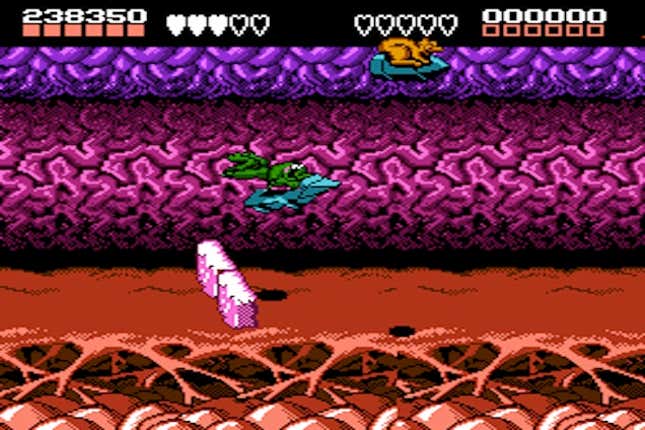
Some game developers understood their new, home-based medium; the designers of The Legend of Zelda knew that a lives system wouldn't make sense. That didn't, however, stop the developers of Zelda II: The Adventure of Link from implementing one.
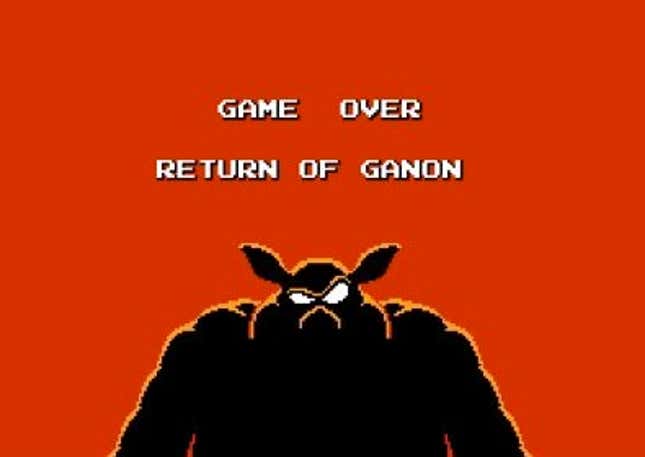
But for many early video games, the lives system gave a player's actions weight and consequence. There's a moment in Super Mario Bros, Level 8-2, that exemplifies this. After dodging Koopas and Spinies, you come across a trampoline. You jump on it, you hit the high bricks, and a 1-Up pops out.
Take a look at this playthrough; the moment in question happens at around 0:22.
In that moment, you have a decision to make. Do you chase down the 1-Up, over multiple pits and Koopa Paratroopas, and risk death? Or, do you take your time navigating the obstacles, thus minimizing the possibility of death, but also sacrificing the insurance of an extra life? The price of a 'Game Over' was steep — you would have to start at the beginning of the game. And even if you knew the continue code (A plus Start on the title screen), you would still have to start at the beginning of the current world.
When extra lives are a precious commodity, it changes a player's entire approach to a game. A push and pull metagame dynamic; there's a conflict between short-term game strategy of avoiding the immediate danger in front of you, and long-term game strategy of putting oneself in present danger in anticipation of future benefits. Often, your decisions change from playthrough to playthrough, depending on your condition. If you're well-stocked with lives, there's no reason to play fast and loose. It's better to play conservatively and pick your battles, like a poker player with a big stack. But if you're running low on lives and have 93 coins in your pocket (only seven coins away from the 1-Up)? You might go 'all-in,' and take desperate, death-defying measures to grab those hard-to-reach pieces of gold.
The coins would usually be positioned in midair at an awkward spot; if you wanted them, you would have to perform a low angle jump, with a lower margin of error. Even powerups were positioned in places where you'd have to make a calculated decision. Like in this section of 5-4, where you must negotiate a massive Firebar in order to get a Super Mushroom. The timing window for this feat was very narrow, and I died so many times on this section, that the mushroom was never worth the risk.
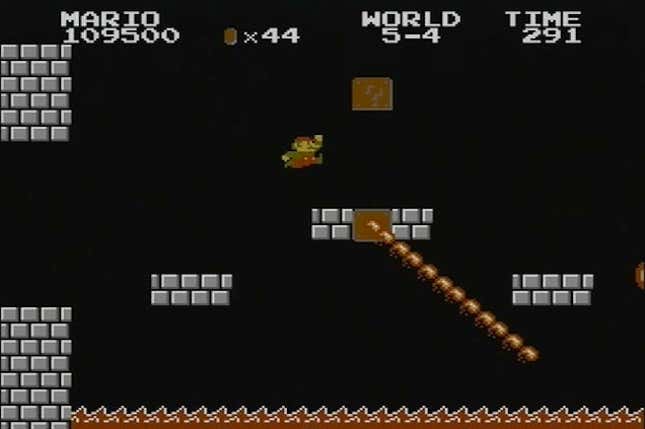
Risk assessment was a large part of the metagame in titles such as this. But just a few years later, designers were clearly straining against the limitations of the lives system. The strengths of the system were also its weaknesses — if players are overly cautious and overly afraid of death, then they won't explore, or go off the beaten path, or experiment with the gameplay.
But rather than get rid of the lives system entirely, many designers shoehorned in workarounds. For instance, in Super Mario World, if you found the secret passageway in the first Ghost House, you opened up a path to the Top Secret Area, which you could visit an unlimited number of times.
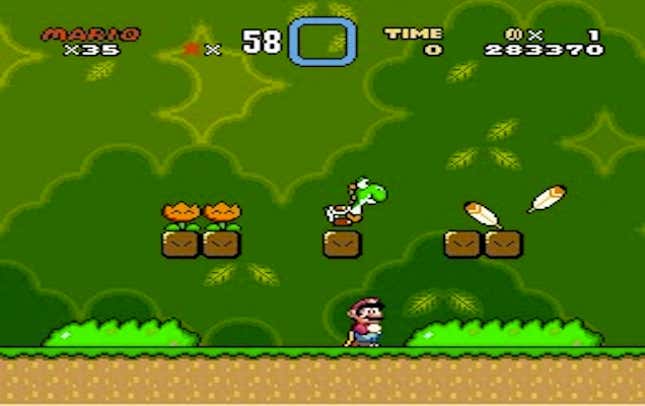
If you punched its center block, you received a Yoshi. If you already had a Yoshi, however, this block would contain a 1-Up. A dedicated player who grinded it out could rack up all the lives he or she needed for a playthrough. And suddenly, the coins, once so crucial and valuable, lost their meaning. The average player had no reason to risk his or her skin when extra lives were so easy to come by.
In Donkey Kong Country, released just three years later, it was obscenely easy to earn extra lives. In the first level alone, you could earn six of them. And If you replayed the level and kept grabbing the Espresso tokens, you could play a bonus game that could add seven or eight lives on top of that. There was no urgency at all.
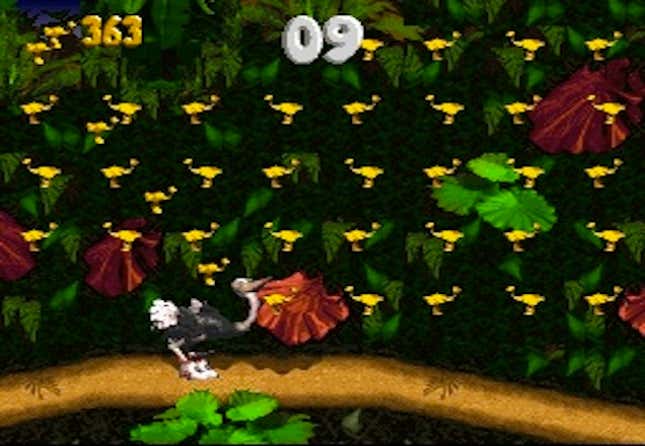
Donkey Kong Country was self-aware enough to poke fun at itself. In the level "Tree Top Town," the developers put a banana at the bottom of the screen. The inference was clear — you should barrel blast yourself into the bottomless death pit. As it turns out, doing so does not result in a dead ape — instead, you're taken to a bonus level. But it was a small indicator of how inconsequential death had become, and how little we were invested in keeping our characters alive.

Fast forward to today, and it seems that death, for the majority of games, has been reduced to a minor inconvenience. Even in a game such as Dark Souls, which made death its entire focus, there is a numbing effect to the whole affair. How much can we really care about characters, or take joy in their successes, if their lives are treated with such cavalier disregard? I liked it better when death was something to be avoided, rather than something that was incidental, or instructive, or even worse, normal.
Grand Theft Auto V, last year's biggest title, really brought this problem into sharp focus. Ben Lindbergh wrote one of my favorite articles about the game's flaws, and aside from pointing out the game's over-reliance on checkpoints (which minimized any and all failure), he also noted the game's meaningless treatment of death.
At a one-star wanted level, if you get arrested, the penalty is that you lose your weapons. At the two-star level or above, however, the cops try to kill you and send you to the hospital. You're charged a hefty bill, but you're also allowed to keep all of your weapons. And since money is so plentiful throughout the game, a twisted truth emerges: It is always better to die than get arrested.

It really took me out of the game's world when I realized this, because I began doing things that made sense for me as a player, but made zero sense for me as a character. Most notably, I made it a point to never get arrested. I always resisted, even if it meant killing myself, and even if it meant shooting random people, so that the cops would have no choice but to kill me. It felt as absurd as it sounds, and I suspect that I'm not the only person who did this. When death is the most preferable negative outcome in a game, there's something very backwards going on.
Amongst the few games which still use a lives system, their developers undermine their implementation. This is what ruined New Super Mario Bros. 2 on the 3DS. It used to be that coins were prized in the Mario franchise — the 100 coins needed to earn a 1-Up were hard to come by. But in New Super Mario Bros. 2, the objective of the game is to collect millions upon millions of coins, which results in earning hundreds of lives. You can't want what you already have in such abundance, and the coin is devalued by its omnipresence. Ironically, for a game that emphasizes and features coins so prominently, they've never felt so worthless.
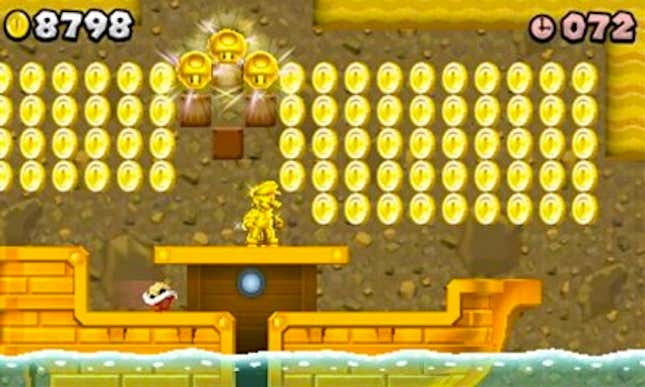
I miss when death used to mean something in video games — when your character's virtual life was precious, and his or her livelihood was something to be guarded rather than experimented upon. How does one build tension and stress in a game, when its mechanics create such low stakes?
Perhaps more widely-spaced checkpoints? Many people complained about Max Payne 3 — because you had to complete entire gunfights before the game quick-saved. But where some players saw unforgiveness, I saw judicious fairness. I likened a single shooting sequence — like the one in the airport terminal at the end — to a single scene in a larger movie. Each battle deserved to stand on its own, as a self-contained narrative. It's better than chopping up the sequence into even smaller segments, which disrupts the tone (and the incredible song choice) and turns the game into a tedious war of attrition. Developers need to trust in people's patience and resilience — that gameplay can be difficult as long as it is fair, and people will feel a greater satisfaction and utility for having conquered it.
Or how about incentives? The Metroid franchise has incentives for finishing its games quickly, after all. What if there were rewards for finishing games cleanly, with as few deaths as possible? The rewards shouldn't be minor, like silver trophies or conceptual art. Alternate endings, optional epilogues, or unlockable characters could motivate people to step lively and take calculated risks. A death-free run would be a devoted fan's holy grail, with major incentives and major bragging rights.
Or how about permanent deaths, like those in XCOM or Fire Emblem, where characters die for good, but the game keeps going? Players care about characters when they are well-characterized and well-designed, and the threat of losing those characters can prevent players from acting thoughtlessly. This wouldn't work in all genres — RPGs, or games with large 'parties' of characters would work best — but when used appropriately, it would give players' actions a purposefulness that is currently lacking.
In short, there needs to be a middle ground: between using a punitive system to artificially increase a game's difficulty, and allowing the player to treat death as nothing more than a minor bump on the road. No doubt, it's a thin line to walk, but it's also one that merits further discussion.
Kevin is an AP English teacher and freelance writer from Queens, NY. His focus is on video games, American pop culture, and Asian American issues. He wrote a weekly column for Complex called "Throwback Thursdays," which spotlighted video games and trends from previous console generations. Kevin has also been published in Joystiq, VIBE, Salon, PopMatters, and Racialicious. You can email him at kevinjameswong@gmail.com, and follow him on Twitter at https://twitter.com/kevinjameswong.
Illustration by Jim Cooke.

